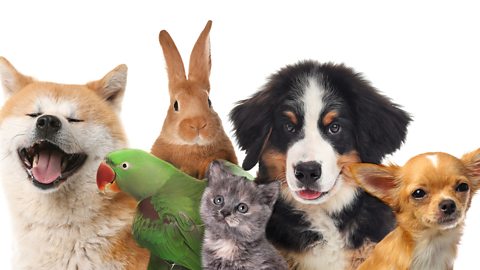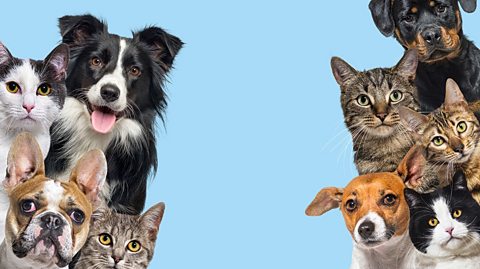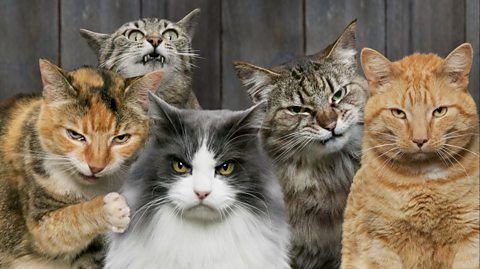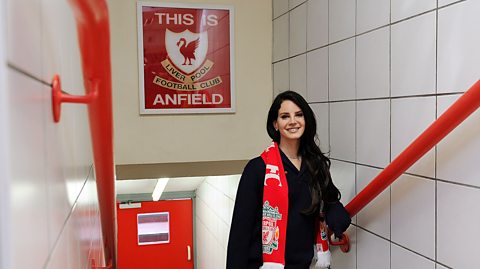The connections we make with our pets can be extraordinary. Whether they're mammals or reptiles, big or small, our animal friends offer us affection, comfort and unconditional love.
But what makes the relationships we have with our cute companions so special? Nat O’Leary, Owain Wyn Evans and Lauren Layfield spoke to ±«Óătv Bitesize to tell us what they love about their pawsome pooches and fur-tastic felines.
Owain: Here she comes. Hello.
Nat: Hey, it's Nat O'Leary from Radio 1 and I have someone very special that I'd like you to meet.
Owain: Hello, I'm Owain Wyn Evans.
Nat: Here's my baby Blue.
Lauren: The greatest day in the calendar year because me, Lauren Layfield, gets to talk about this. The duck. Duckie Layfield, don't we.
Owain: Frannie is a 14-year-old rescue cat. We got her when she was a small cat, not a kitten.
Nat: This is my ragdoll kitten. She is one years old, her name's Blue. She's just had a cheesy treat so she's very happy.
Lauren: I was asked to record some thoughts about the things I love about Duckie. Unfortunately if I did do that we'd be here until February 2025.
Owain: She is very well behaved and she's very fluffy as you can see, which I love.
Nat: She flops like a ragdoll when you pick her up.
Owain: She has bought so much joy to my life, to my other half Arran's life as well. She's definitely part of the family now.
Lauren: She is just gorgeous, she is cute, she is unique. She's a little rescue pup. I think our lives are infinitely better for having dogs in it.
Owain: She loves a cuddle, or as we'd say in Welsh a cwtch. But sometimes she just likes her own company. And there she goes to sit on the other end of the sofa away from me.
Nat: She is my best best friend. I love her so much. She's always so cuddly. Always wants to play. And always up to mischief, a lot like me. And look at that face, I mean, what's not to love?
The im-paw-tance of animal companionship
The history of pets is long and complex, with the concept of pethood as we know it today coming into existence in the 18th and 19th Centuries. But these days the human-animal bond is celebrated in our daily lives and has become increasingly researched by academics across the world.
In the 1990s, a small group of scholars who studied pet ownership coined the term anthrozoology. This word is used to describe a field of study relating to the interactions and relationships between humans and animals.
But can science explain why we love our pets so much? Studies focused on the health benefits of having a pet have produced mixed results. However, others have found that pets provide emotional support to their owners, with some even able to detect how we're feeling.
A 2022 study conducted at Queen’s University Belfast discovered that dogs - already known for having an amazing sense of smell - can detect when humans are stressed with remarkable accuracy.
In this study four dogs - Treo, Fingal, Soot and Winnie - were taught to identify samples of sweat and breath of 36 different human participants before and after completing a difficult maths problem.
By detecting chemical changes in these, the pooches could correctly pick out the stress samples on average 93.75% of the time. This demonstrates that dogs can instinctively pick up on human stress, without audio or visual cues, and reinforces that they are highly sensitive and intuitive animals.
Other theories suggests that the bond between humans and pets are so special because they have a soothing and therapeutic effect on us. This is largely due to social recognition, the ability humans have to identify someone or something - like a pet - as being important to them. Social recognition is a mechanism that helps us develop deep relationships and is a key element of maintaining positive mental health.
While it isn’t possible to measure our relationships with our pets using scientific or objective methods, the feeling of them greeting you after a long day at school, wagging their tails to get your attention or scooting over for a cuddle on the sofa is enough to show that the connection is a special one.

What do we love about our pets?
So what do our ±«Óătv friends have to say about their pets?
“I love having a pet cat because she keeps me company all the time and she’s always available for cuddles,” ±«Óătv Radio 1 Presenter Nat O’Leary told us.
Nat has a one-year-old ragdoll kitten named Blue, who she describes as her best friend. “She always wants to play and [is] always up to mischief.”
C±«Óătv and ±«Óătv Radio 1 presenter Lauren Layfield is also the owner of a rescue pet, in this case a dog called Duck. Describing Duck in three words, Lauren told us he is, “Gorgeous, cute and unique.”
She added, “I think our lives are infinitely better for having dogs in it.”
±«Óătv Radio 2 DJ Owain Wyn Evans has a 14-year-old rescue cat called Franny. He told Bitesize: “I love being around her because I find her very calming. She is well behaved and she’s very fluffy, which I love.
“She loves a cuddle, or as we’d say in Welsh, a cwtch.”
When talking about the impact Franny has had, Owain said: “She has bought so much joy to my life and my other half Arran's life. She’s definitely part of the family now.”
This article was published in April 2024
How were our favourite animals domesticated? A brief history of pets
±«Óătv Bitesize takes a look at how our favourite animals became pets over the years.

The cat-aclysmically challenging cat quiz
Get your thinking cat on and take a swipe at this tricky quiz about all things feline.

When worlds collide: Are these the most unlikely collaborations ever?
From musical duets to television crossovers, ±«Óătv Bitesize takes a look at three surprising collaborations.
